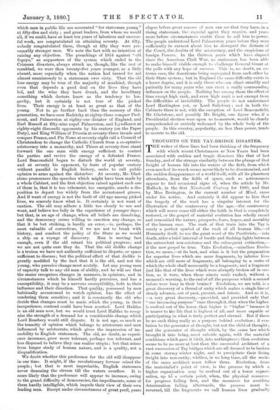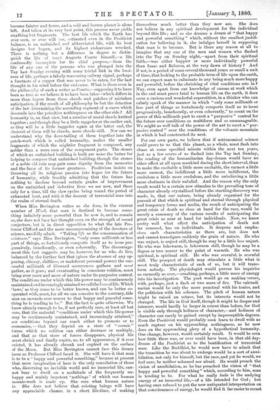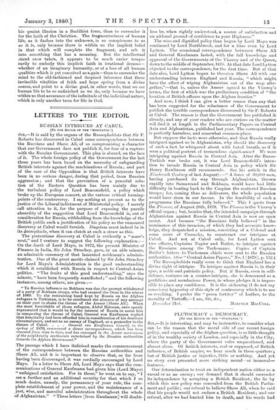THOUGHTS ON THE TAY-BRIDGE DISASTER. /THE writer of these lines
had been thinking of the frequency- .' with which recent Christmases or New Years had been associated with sudden and tragic disasters like that of last Sunday, and of the strange similarity between the plunge of that freight of human life into the waters of the firth, from which even much of its wreck seems never likely to be disentombed, and the sudden disappearance of a world itself, with all its planetary attendants, from the fields of space, such as astronomers appear to find occasional signs of, when the article by Mr. Mallock, in the first Nineteenth Century for 1880, and that by Miss Bevington, in the current number of Mind, came under his notice. And certainly it did appear to him that the tragedy of the week has a singular interest for the illustration of the controversy of the age,—the controversy which will never cease till either the faith in God is completely restored, or the gospel of material evolution has wholly recast and remoulded the nature, prospects, fears, hopes, and morality of the human race. The rush of that train into the Tay is surely a perfect symbol of the rush of all human life,—of Humanity itself, to use the great word of the Positivists,—into death, after a brief interval of bustle and flashing lights between the antecedent non-existence and the subsequent extinction,— if the new gospel be true. Take Evolution,—mindless Evolu- tion, we mean,—at its best, and what is it but the preparation for superior lives which are mere fragments, by inferior lives which are still more of fragments, all belonging to a series of which the whole shall necessarily be a fragment; and a fragment just like that of the lives which were abruptly broken off in sec- tion, as it were, when these ninety souls rushed, without a moment's warning, to the end of all the purposes which a second before were busy in their brains P Evolution, we are told, is a great discovery of a thread of unity which makes a single lino of steady advance, out of past, present, and future. And so it is, —a very great discovery,—provided, and provided only that "one increasing purpose" runs through it, that when the higher is evolved out of the lower, that higher is " higher " because it is nearer to the life that is highest of all, and more capable of participating in what is truly perfect and eternal. But if there be no such thing really as a purpose behind evolution ; if evo- lution be the generator of thought, but not the child of thought ; and the generator of thought which, by the same law which brought it into being, must subside again, with the material conditions which gave it birth, into nothingness ; then evolution seems to be no more at best than the successful architect of a vast succession of Tay bridges which are all doomed to be broken in some stormy winter night, and to precipitate their living freight into non-entity, whither, in no long time, all the works of the same architect must follow them. Evolution, from the materialist's point of view, is the process by which a higher organisation may be evolved out of a lower organi- sation, up ti3 a certain point, when, the physical resources for progress failing first, and the resources for avoiding deterioration failing afterwards, the process must be reversed, till the fragments we call human lives gradually
become fainter and fewer, and a cold and barren planet is alone left. And taken at its very best point, this process never yields anything but fragments. The best life which the Earth has ever seen, or ever will 'see, estimated even in the Positivist balance, is an unfinished and abbreviated life, with its best designs but begun, and its highest endeavours wrecked. There is nothing but a difference in degree to distin- guish the life of (say) Auguste Comte himself,—a life confessedly incomplete for its chief purpose,—from the life of any one of the persons who was plunged into the Tay last Sunday evening with some trivial link in the busi- ness of life, perhaps a falsely reassuring railway signal, perhaps a foretaste of a supper that was never to be eaten, for the last thought in his mind before the end came. What is there even in the philosophy of such a writer as Comte,—supposing it to have been as true as we believe it to have been false—which differs in more than degree from these shreds and patches of mistaken anticipation, if the result of all philosophy be but the detection of the law determining the ascending segment of a curve which descends into the primitive nothingness on the other side ? All humanity is, on that view, but a number of moral shreds knitted together; and though they be a little raggeder at the earlier end, as they will be a little raggeder again at the latter end, the choicest of them will be shreds, mere shreds still. Nor can we understand why the dove-tailing of them together into the patch-work which is called humanity, makes the smaller fragments of which the mightier fragment is composed, any nobler than a mere sum of the component parts. The stones of which an unfinished building is built are none the better for helping to compose that unfinished building, though the stones of a noble old ruin may gain some dignity from the memories and the fame of its former greatness. Positivism insists on throwing all its religious passion into hopes for the future of humanity, while frankly admitting that the future has nothing to disclose beyond certain grades of improvement on the unfinished and defective lives we see now, and these only for a time, till the slow cycles bring round the period of exhausted heat, and with it the descent of terrestrial man into the realm of eternal death.
When Miss Beviugton writes as she does, in the current number of 2ifiad, that man is destined to become some- thing infinitely more powerful than he now is, and to remain so, she does not base her thought even on the strength of sound conjecture, but is in direct opposition to what the late Pro- fessor Clifford and the more uncompromising of the devotees of science, candidly admit. "Taking life as the consummation of existence," says Miss Bevington, "only some millionth or less part of things, so fortuitously comports itself as to issue pro- gressively, beneficently, or even coherently. The discourage- ment this fact suggests may be, however, for us who do live, balanced by the further fact that (given the absence of any op- posing, clumsy, shiftless, or maleficent personal power) the suc- cessful millionth of lifeward occurrences gathers and must gather, as it goes; and eventuating in conscious volition, must bring ever more and more of nature under its purposive control. The conditions under which this life-power may be continuously maintained and increasingly attained we call the laws of life. Which 'laws,' as they come to be better known, and can be better co- operated with, must, for all we can conceive to the contrary, tide man on onwards ever nearer to that happy and peaceful some- thing he is tending to be." But the fact is quite otherwise. We know already enough to be, if not perfectly sure, at least all but sure, that the material "conditions under which this life-power may be continuously maintained, and increasingly attained," are conditions beyond our reach either to promote or to economise, — that they depend on a store of " cosmic " forces which no volition can either decrease or multiply, and that as that store of forces disappears, physical life must shrink and finally expire, as, to all appearance, if it ever existed, it has already shrunk and expired on the surface of the Moon. But Miss Bevington cannot face this dreary issue as Professor Clifford faced it. She will have it that man is to be a happy and powerful something," because at present that mere imagination of hers is the only consolation of those who, discerning no invisible world and no immortal life, can- not bear to dwell on a multitude of the frequently un- happy and mainly impotent 'nothings' of which our human mosaic-work is made up. She sees what human nature is. She does not believe that existing beings will have any appreciable chance, in a short life-time, of making themselves much better than they now are. She does not believe in any spiritual development for the individual beyond this life ; and so she dreams a dream of "that happy and powerful something" which, without the smallest justifi- cation for believing in it, she indulges herself in supposing that man is to become. But is there any reason at all to - imagine that any one of the men and women who flashed into the Tay on Sunday night,—apart from their spiritual faith,—was either happier or more individually powerful than Isaac and Rebecca, at the very dawn of history ? And if not, is a period of some several thousand years so small a unit of time, that looking to the probable term of life upon the earth, we can expect man to culminate in any being much more happy and powerful, before the shrinking of vital conditions sets in ?
Nay, even apart from our knowledge of causes at work which in the end must prove fatal to human life on the earth, it does seem a curious and wonderful superstition, in a thinker who can calmly speak of the manner in which "only some millionth or less part of things so fortuitously comports itself as to issue progressively, beneficently, or even coherently," to count on the power of this millionth part to exert a " purposive " control for the future over conditions so multiform and so unmanageable. We might as well talk of the power of the ant to exert a "pur- posive control" over the conditions of the volcanic mountain in which it had constructed its nest.
For our own parts, we believe that if astronomical science could prove to us that this planet, as a whole, must flash into chaos at some specified minute within the next ten years, just as a few scores of us flashed into the Tay last Sunday, the rending of the humanitarian day-dream would have no other effect at all upon mankind during the short interval, than to make the excitable a little more excitable, the earnest a little more earnest, the indifferent a little more indifferent, the credulous a little more credulous, and the unbelieving a little more obstinate in their unbelief. And the reason why the only result would be a certain new stimulus to the prevailing tone of character already crystallised before the startling discovery was made, is, that our nature, being already organised for the pursuit of that which is spiritual and eternal through physical and temporary forms and media, the result of anticipating the great crisis of death as close at hand for the race, would be merely a summary of the various results of anticipating the great crisis as near at hand for individuals. Now, we know pretty well what effect the anticipation of death not far removed, has on individuals. It deepens and empha- sises such characteristics as there are, but does not and cannot transfigure suddenly the grain of nature. He who was unjust, is unjust still, though he may be a little less unjust.
He who was lukewarm, is lukewarm still, though he may be a degree or two nearer to the point of warmth. He who was spiritual, is spiritual still. He who was scornful, is scornful still. The prospect of death may stimulate a little what is most truly characteristic of each of us, but it will trans- form nobody. The physiologist would pursue his inquiries as earnestly as ever,—crushing, perhaps, a little more of energy into his investigation. The poet would go on making verses, with, perhaps, just a flash or two more of fire. The valetndi narian would be only the more punctual with his tonics, and the politician with his schemes. The pitch of human nature might be raised an octave, but its interests would not be changed. The life in God itself, though it might be deeper and intenser, would hardly be larger in extent than before, for God is visible only through holiness of character,—and holiness of character can rarely be gained except by imperceptible degrees. Even the Positivist would probably soon learn to dwell with as much rapture on his approaching nothingness, as he now does on the approaching glory of a hypothetical humanity. One change, however, would certainly result. It would be seen how little there was, or ever could have been, in that old day- dream of the Positivist as to the beatification of terrestrial man. Like the Buddhist, he would now have to admit that the transition he was about to undergo would be a sort of anni- hilation, not only for himself, but the race, and yet he would, we feel sure, be neither ashamed nor afraid. He would preach the
vision of annihilation, as he has preached the vision of "that happy and powerful something" which, according to him, man is tending to be. For what he really feels is the undying energy of an immortal life,—of a life intended for God ; but having once refused to put the now antiquated interpretation on that consciousness of energy, he would find it far easier to recast
his quaint illusion in a Buddhist form, than to surrender it for the faith of the Christian. The fragmentariness of human life, as it flashes into the unknown, is so conspicuous to us as it is, only because there is within us the implicit belief in that which will complete the fragment, and orb it into something that has a meaning. But the intellectual stand once taken, it appears to be much easier tempo- rarily to embody this implicit faith in irrational dreams— whether of an imaginary humanity, or of a loss of all human -qualities which is yet conceived as a gain—than to surrender the mind to the old-fashioned and despised inference that these invincible vitalities of faith and hope spring from a divine source, and point to a divine goal, in other words, that we see human life to be so unfinished as we do, only because we have within us that assurance of the infinitude of the individual nature, which is only another term for life in God.












































 Previous page
Previous page